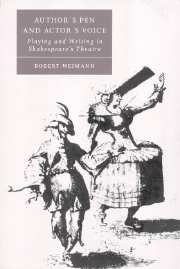Book contents
- Frontmatter
- Contents
- Preface
- Introduction: conjunctures and concepts
- 1 Performance and authority in Hamlet (1603)
- 2 A new agenda for authority
- 3 Pen and voice: versions of doubleness
- 4 Playing with a difference
- 5 Histories in Elizabethan performance
- 6 Hamlet and the purposes of playing
- 7 Space (in)dividable: locus and platea revisited
- 8 Shakespeare's endings: commodious thresholds
- Afterword: thresholds forever after
- Notes
- List of works cited
- Index
Introduction: conjunctures and concepts
Published online by Cambridge University Press: 22 September 2009
- Frontmatter
- Contents
- Preface
- Introduction: conjunctures and concepts
- 1 Performance and authority in Hamlet (1603)
- 2 A new agenda for authority
- 3 Pen and voice: versions of doubleness
- 4 Playing with a difference
- 5 Histories in Elizabethan performance
- 6 Hamlet and the purposes of playing
- 7 Space (in)dividable: locus and platea revisited
- 8 Shakespeare's endings: commodious thresholds
- Afterword: thresholds forever after
- Notes
- List of works cited
- Index
Summary
A division occurred, between writing and action, which has become more apparent in each successive phase of this culture. One of the sources of this division was print: the attachment of writing to this static form, away from the human voices and movements to which it stood in a merely abstract relation. Another source, of a deeper kind, was a revaluation of action within the society. Certain ‘representative’ modes of dramatic writing seem to have developed, hand in hand, with certain ‘representative’ institutions for political actions and decision. Near their most serious interests, most men learned to give up the idea of intervention, participation, direct action, even as a possibility, in favour of indirect, conventional and reacting forms.
Raymond Williams, “Argument: Text and Performance,” Drama in Performance (1968), p. 185This study seeks to revisit relations of writing and performance in the Elizabethan theatre at a time when in our own cultural and critical discourses the authority of the printed text is undergoing far-reaching reassessments. While both the institution of authorship and the stability of the text have become controversial issues, ‘performance’ and ‘performativity’ are dominating critical discussion almost, as one provocative critic believes, “to the point of stupefaction” (Diamond, Performance, Introduction 2). ‘Performance’ has advanced to something like an ubiquitous concept which we use either to sound, or intercept our discontent with, the epistemology of representation. But even though ‘performance’ and the ‘performative’ have come close to constituting a new paradigm bridging several disciplines, the study of theatrical performance has, somehow, remained in the doldrums.
As Richard Schechner declared in a Tulane Drama Review editorial (1992): “The new paradigm is ‘performance,’ not theatre” (Schechner, “New Paradigm” 7).
- Type
- Chapter
- Information
- Author's Pen and Actor's VoicePlaying and Writing in Shakespeare's Theatre, pp. 1 - 17Publisher: Cambridge University PressPrint publication year: 2000



